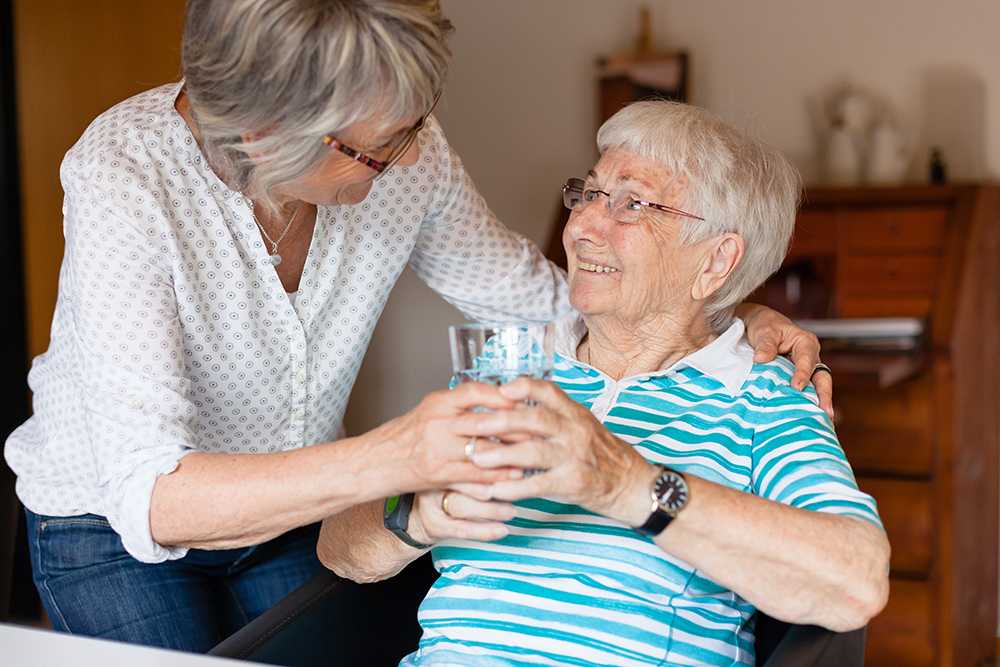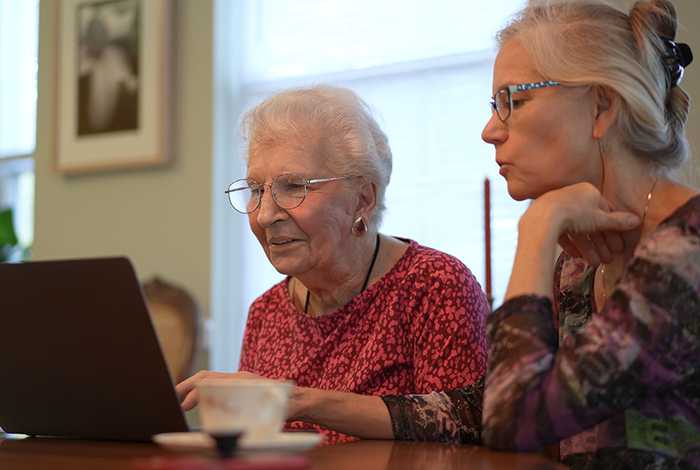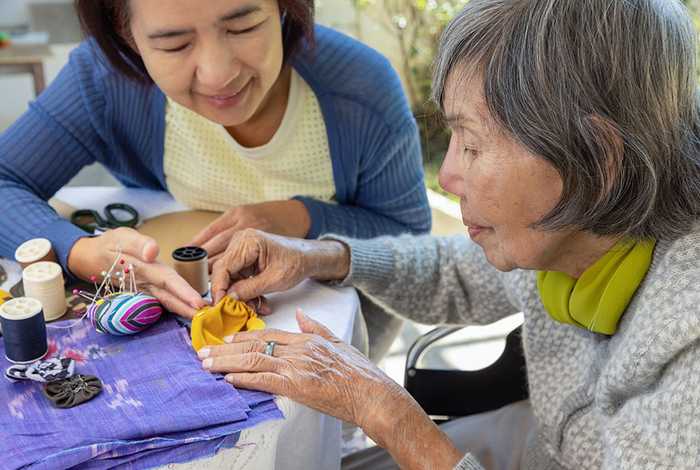Posted by Janine Griffiths
What is adult social care and who is it for?

Let’s start by saying this: it’s completely normal to feel a little unsure about what adult social care actually means. It’s not something most of us think about until we really need to and even then, the information can feel buried under layers of jargon or hidden behind complicated processes.
So if you’re sitting there wondering, ‘what is adult social care’, you're certainly not alone.
The truth is, many people reach the point of needing support before they’ve ever heard the phrase - or had the chance to unpack what it really involves. And that’s okay.
There’s no shame in asking questions or wanting straight answers. Whether you’re exploring support for yourself or a loved one, this blog is here to offer just that: honest, clear guidance in plain English. No complicated language. No glossing over the things that matter.
Think of this as a starting point, as a way to turn confusion into clarity, and uncertainty into a bit more control. Because understanding your options can bring not just reassurance, but relief. And when it comes to care, that feeling of being informed and empowered really does make all the difference.
What is adult social care?
Adult social care is one of those phrases that can feel strangely distant, like something that belongs in leaflets or policy papers, not in real life. But when the time comes to think about support for yourself or someone close to you, suddenly the question becomes very real, very quickly.
At its heart, adult social care is simply about helping people live well when everyday life starts to get more difficult. It means offering the right kind of support - whether that's physical, emotional or practical - so that you can continue to live as independently, comfortably and meaningfully as possible.
It’s not just for older adults either. While many people first hear the term later in life, adult social care can support anyone over the age of 18 who is finding daily life a challenge. That could be because of illness, disability, mental health concerns or changes that come with age.
So, what is adult social care? In essence, it’s support that helps you manage things like personal hygiene, getting dressed, preparing meals, managing medication or staying connected to your community. It might involve someone coming into your home, visiting a local centre, or even moving into a care setting if that becomes necessary.
It’s also important to understand what adult social care isn’t. It’s not the same as medical or clinical treatment - though it often works alongside healthcare to give you more well-rounded support.
Ultimately, adult social care is about quality of life. It’s about recognising that everyone deserves to feel safe, valued and in control, even when extra help is needed.
Who might need adult social care?
It’s easy to assume that adult social care is just for people in their later years but that’s only one part of the picture. The truth is, the need for care doesn’t come with a set age or stage. It comes with circumstance. With life. And life, as we all know, doesn’t always follow a tidy script.
So, who might need adult social care? The answer is: more people than you might think.
Some need support because age has made certain daily tasks more tiring or painful. Others may be living with a physical or learning disability that makes parts of life more complex. For some, long-term health conditions or mental health challenges bring their own difficulties. And there are those who simply need a bit of help to recover after a hospital stay or a sudden illness, even if just for a short time.
Carers, too, can fall into this category. When you’re constantly supporting someone else, sometimes the person who needs care is you.
It’s not about ticking boxes or fitting into a neat category. It’s about recognising when life could be made easier and knowing that there’s support designed to do just that. Adult social care isn’t reserved for a certain age group. It’s there for anyone whose day-to-day life has become harder than it needs to be. Because needing help is never a weakness, it’s just human.
What types of support are included in adult social care?
Support doesn’t always look the same for everyone, and that’s exactly how it should be. One of the strengths of adult social care is how flexible it can be. It adapts. It grows. It meets you where you are, then walks with you at your pace. Whether you need a little help to stay independent at home or more hands-on support in a residential setting, the care is shaped around you.
For some, that might mean gentle help with day-to-day tasks like getting washed and dressed, preparing meals or remembering to take medication. These small acts of care can make a huge difference in helping you stay safe and comfortable in your own space.
Others may benefit from community-based support which could include things like transport to appointments or visits to a local centre for a bit of structure and company.
There’s also care that takes place outside the home, including supported living or care homes for people who need more regular, round-the-clock help.
And in today’s world, care can be digital too. Things like fall alarms or remote monitoring systems can give peace of mind to both you and your family, often without needing anyone to be physically present.
But care isn’t just practical. It’s emotional, too. A big part of adult social care is about staying connected, feeling seen and valued, and not becoming isolated. Because support isn’t only about what you do, it’s about how you feel while doing it.
How do I get help through adult social care?
The idea of asking for help can feel a little daunting, especially when you’re not sure where to begin. If adult social care is new to you, the process of getting support might seem wrapped up in paperwork, assessments or unknown steps. But here’s the truth: it’s not as overwhelming as it sounds. And you don’t have to figure it out alone.
So, how do you actually access adult social care if you think you might need it? The first step usually involves something called a care needs assessment (sometimes referred to as a care act assessment), and this is carried out by your local authority. It’s simply a conversation - an honest look at your day-to-day life, what’s going well, and where things might be getting harder. You don’t need to have the answers prepared. You just need to be open about what support would help you feel more confident, comfortable or safe.
You can refer yourself for an assessment or a health professional can do it on your behalf. Either way, it all starts with someone listening.
There’s also something called a financial assessment. This helps determine whether the local authority will contribute to the cost of your care or if you’ll be funding some or all of it yourself. It can feel personal, but it’s handled with care and confidentiality.
The most important thing to remember is that it’s always better to act sooner rather than wait for a crisis to push things forward. Reaching out for help isn’t a sign of failure. It’s a brave and positive step and there are people ready to support you without judgment.
So, if you’re wondering who might need adult social care and whether that includes you - it might. And there’s no harm at all in finding out.
Why understanding adult social care matters
When you have a clear picture of what’s available and how it all works, you’re not just gathering information - you’re giving yourself the power to make thoughtful, confident decisions. It becomes easier to recognise when support might help, and to ask for it without hesitation.
Knowing what adult social care is goes beyond simply having a definition in mind. It’s about understanding how it can support your daily life and help you maintain your dignity, even when things become more difficult. It’s also about being able to plan - not in panic or fear, but with calm, steady foresight.
This kind of knowledge isn’t only useful in a crisis. In fact, it’s what can help prevent one. It gives you and your loved ones time to consider options, talk openly, and put the right things in place without feeling rushed or overwhelmed.
So if this all feels a bit much right now, that’s okay. You don’t need to have it all figured out in one go. Just starting with an honest question - ‘what is adult social care ‘- can lead you towards the clarity and confidence you deserve.
Taking the next step with confidence
If you’ve made it this far, take a moment to feel proud. It’s not always easy to explore something new, especially when it involves your health. But asking the question ‘what is adult social care’ is an important first step and now, you have a clearer picture.
At its heart, adult social care is there for older adults, younger adults, carers - anyone whose needs have changed and who wants to maintain a good quality of life.
The journey doesn’t have to be confusing. If you’re ready to explore your options or just want to see what support is out there, Autumna can help you take that next step with confidence and clarity. You’re not on your own.
Looking for a care provider?
If you are looking for a care provider - whether that is home care, a care home, live-in care or retirement properties, Autumna can help. Getting started is easy. On our home page, you’ll find all of the options you need in the boxes above the search bar. Simply select the type of care you need, type in your location and press enter.
You will then see a list of search results. The tabs above the search results make it easy to filter the results even further. You can also use our shortlisting tool to generate an even more personalised list of results.
However, sometimes speaking to someone over the phone can demystify the process if you are still having trouble finding the help you need. Our knowledgeable and friendly experts are here 7 days a week to assist with all of your queries. Simply get in touch on 01892 335 330 and they’ll be happy to help.
Receive a Free Care Provider Shortlist!
Let our expert team of advisers get your search off to a great start.
Tell us a little about your needs and we'll send you a bespoke shortlist of care providers! Click the button below to begin, it takes just a few minutes.
Other articles to read
From the blog

Older Persons Care Advice
Ultimate guide to jointly owned property and care home fees
September 26th, 2025
Understand jointly owned property and care home fees, how assessments work, and steps to protect your finances and plan ahead with confidence.

Older Persons Care Advice
What are the pros and cons of care homes?
September 26th, 2025
Weigh the pros and cons of care homes to make the right choice for you or a loved one. Discover benefits, challenges, and tips for finding the best fit.

Older Persons Care Advice
Person centred care and dementia: A guide for families
September 23rd, 2025
Discover how person centred care and dementia support go hand in hand. Learn practical tips, expert insight, and guidance for families seeking the best care.
Frequently Asked Questions
No, adult social care varies depending on where you live in the UK. Each local authority sets its own eligibility criteria, services and funding rules. This means what’s available (and how you access it) may differ in England, Scotland, Wales and Northern Ireland. Always check with your local authority for specific guidance.
Yes. If you’re eligible for funding, you may be offered a personal budget or direct payment. This allows you to choose and arrange your own care. If you're self-funding, you have full freedom to choose any registered care provider that suits your needs.
No. While your local council plays a key role in assessments and sometimes funding, care can be delivered by private companies, family members, charities, and not-for-profit organisations. Many people arrange their care independently, especially if they’re self-funding.
Even if you’re not eligible for financial help, your local authority must still assess your needs and provide guidance. They should offer information about local services, private care options, and resources to help you plan and manage your own support.
Yes. Adult social care isn’t just for long-term needs. You can receive short-term support after a hospital stay, illness or injury to help you regain independence. This is sometimes called reablement care and can last a few weeks, depending on your recovery.






